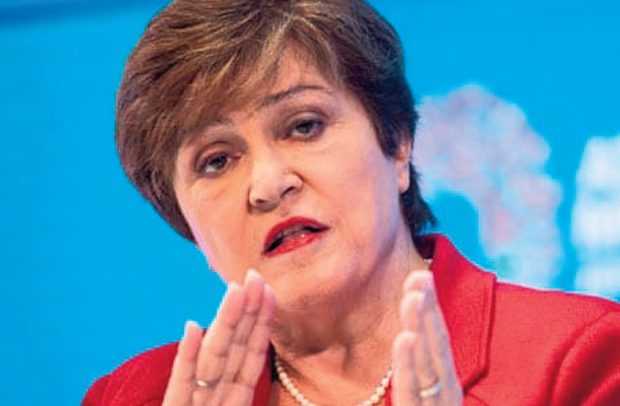Kristalina Georgieva
Managing Director of the International Monetary Fund (IMF), Kristalina Georgieva, has stated that members of the Fund are proud to be partners with Ghana in addressing the country’s difficult economic and financial conditions.
Speaking during a news conference after the IMF Board approved a US$3 billion Extended Credit Facility (ECF) arrangement, she praised Ghana on “a strong programme of reforms to revitalise growth and reduce the country’s debt burden.”
Madam Kristalina explained that the decision was also a major milestone for the G20 Common Framework.
“The commitment by the Official Credit Committee to help make Ghana’s debt sustainable was essential for the approval of the Fund’s programme and it signals important progress in the G20 Common Framework,” she noted.
According to her, the Board’s decision is the beginning of the work the Fund will do together with the authorities of Ghana for the implementation of the programme to benefit Ghanaians.
On Wednesday, the IMF’s Executive Board approved a 36-month ECF agreement worth approximately US$3 billion, or 304 percent of quota for Ghana.
The programme is based on the government’s Post COVID-19 Programme for Economic Growth (PC-PEG), which aims to restore macroeconomic stability and debt sustainability.
It includes wide-ranging reforms to build resilience and lay the foundation for stronger and more inclusive growth.
According to the Fund, the Executive Board’s decision will allow for an immediate transfer to Ghana of SDR 451.4 million (about US$600 million).
The Fund said large external shocks in recent years have exacerbated Ghana’s pre-existing fiscal and debt vulnerabilities, resulting in a loss of international market access, increasingly constricted domestic financing, and the government’s reliance on monetary financing.
“Decreasing international reserves, cedi depreciation, rising inflation and plummeting domestic investor confidence, eventually triggered an acute crisis,” it intimated.
The government has taken bold steps to tackle these deep challenges, including by accelerating fiscal adjustment, beside the launching of a comprehensive debt restructuring to address severe financing constraints and the unsustainable public debt.
Key Policies
Key policies under the country’s programme include large and front-loaded fiscal consolidation to bring public finances back on a sustainable path, complemented by efforts to protect the vulnerable.
The adjustment effort will be supported by ambitious structural reforms in the areas of tax policy, revenue administration, and public financial management, as well as steps to address weaknesses in the energy and cocoa sectors.
The IMF said appropriately tight monetary and flexible exchange rate policies would help bring inflation back to single digits and rebuild international reserves.
It added that Ghana’s programme also had a strong focus on preserving financial stability and encouraging private investment and growth.
It is expected to help Ghana overcome immediate policy and financing challenges, including through its catalytic effect in mobilising external financing from development partners and providing a framework for the successful completion of the ongoing debt restructuring.
Kristalina said, “Fiscal consolidation is a core element of the programme. A substantial and front-loaded fiscal adjustment has started with the 2023 budget.”
“Enhanced revenue and streamlined expenditure will be combined with policies to protect vulnerable households and create room for higher social and development spending in the medium term.
“With a view to fostering lasting fiscal discipline, the authorities are also advancing reforms to enhance domestic revenue mobilisation, strengthen public financial management, and tackle the deep challenges in the energy and cocoa sectors,” she added.
“Preserving financial sector stability is critical for the success of the programme. Given the adverse impact of the domestic debt restructuring on balance sheets of financial institutions, the authorities will devise and implement a comprehensive strategy to rapidly rebuild financial institutions’ buffers and exit from temporary regulatory forbearance measures,” the IMF boss said.
By Ernest Kofi Adu

